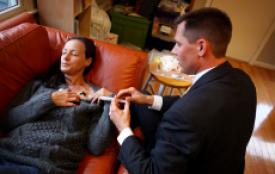NEWS: "The doctor of last resort" is part three of excellent Lyme series from Roanoke Times

The third installment of this newspaper's series on chronic Lyme takes a comprehensive look at a doctor who treats tick-borne disease outside of the IDSA guidelines. Find links all three parts here.
Part one:
From the Roanoke Times, Dec. 19, 2010
Salvos launched in Lyme dispute
The rise of the tick-borne disease in Virginia has created a political and medical divide. Part one in a three-day series.
By Beth Macy
Her husband called her The Tiger. Their colleagues did too.
Taylor Albright was such a fierce lawyer that she once negotiated a land-dispute settlement from $12,000 down to $200 — and she’d had the gall to try for $5.
At the Manhattan law firm where she landed after law school, she wore European designer suits. Her favorite was the brass-buttoned Burberry from London; same tailor as the Queen.
But the suits seemed too flashy for bucolic Blacksburg, where she and her lawyer husband, Victor Bongard, moved in 1999 to be closer to family and where, on nice days, she rode her Harley to work.
It was 2006, the height of the real-estate boom, and the couple were so busy with their practice and title agency — and raising three kids — that frequently they took turns working through the night.
To house their expanding firm, they bought 4.5 acres on the edge of Blacksburg between farmland and commercial property. The development would be green, she told a reporter, something that would “achieve the triple bottom line — environmental stewardship, social responsibility and economic prosperity.”
But two weeks before the scheduled groundbreaking, The Tiger lost her bite.
Forget the Harley. Try as she might, Taylor could not get out of bed.
Click here to read the rest of this article.
Here’s part two:
In search of hope, facts
The burden of Taylor Albright’s longtime physical and mental ailments
has chipped away at her livelihood and her family’s finances.
Taylor Albright has drawn support from her family, including daughter Victoria Bongard (left), 12, and son Griffin Bongard, 8. Her prolonged intravenous antibiotics cost almost $40,000 a year, and many doctors contend that treatment is harmful to both her and the public. KYLE GREEN | The Roanoke Times
By Beth Macy | 981-3435
Her day no longer revolves around legal contracts and land deals.
Taylor Albright had been such a fierce negotiator that her colleagues nicknamed her The Tiger. But now the 45-year-old lawyer finds it a challenge to get her three children to soccer practice and order pizza on the phone.
Some days she has enough energy to do both, but often she can do only one — and it takes an iPhone alarm to prompt her.
She’s set her phone to quack, like a mama duck calling her ducklings, when it’s time to pick the kids up from their Blacksburg school. When she forgets a phrase or can’t finish a sentence, her children joke that she’s speaking “Mommish.”
It’s a language that even she doesn’t always understand. Once she referred to herself as Tammy. Another time she caught herself misspelling her son Griffin’s name.
The crushing tiredness and arthritic joint pain, the neurological complications that cloud her ability to think, the life-threatening blood clots and debilitating incontinence — Taylor and her doctor believe they are all manifestations of the chronic Lyme disease she’s had for more than 25 years.
Click here to read the rest of part two.
Part three:
The doctor of last resort
Most Western Virginia physicians side with CDC guidelines where chronic Lyme disease is concerned. But one area doctor risks it all to make her own path.
Dr. Cathryn Harbor is open to treating Lyme disease patients beyond the medical establishment’s guidelines — drawing praise from patients but criticism from other doctors. ‘What’s difficult is to feel that I’m endangered when all I’m doing is the best I know how to do,” she says. KYLE GREEN | The Roanoke Times
By Beth Macy | 981-3435
LEXINGTON — Dr. Cathryn Harbor was volunteering at her children’s camp outside Charlottesville last summer when she noticed a startling phenomenon: In the span of one week, 10 of her 100 campers came to her complaining of flulike symptoms.
Each reported being bitten by a tick, and four were spotted with suspicious rashes. All 10 cases were a ringer — at least in Harbor’s mind — for suspected Lyme disease.
With their parents’ permission, she treated the children immediately, and then she called the health department to ask: Should we shut the camp down?
Harbor, 50, runs a solo family practice in Lexington. An avid cyclist, she rides her bike to work, which is a cottage nestled amid Washington and Lee University’s fraternity houses.
Raised in a family of academics and activists — her minister dad was a Davidson College professor, both parents were Vietnam War protesters and civil rights advocates — she had dreamed of curing world hunger before she realized she hated agricultural economics and went to theUniversity of North Carolina School of Medicine instead.
She hated medical school, too — but only because it seemed more about regurgitating facts than about complex, critical thinking.
“I don’t think t
he world works in multiple choice,” she says.
Her office opens onto a begonia-filled screened porch. During the warm months, her patients hear crickets chirping.
But the medical world beyond her doors is not so inviting.
In the past year, Harbor has become an outlier, a minority doctor who believes in the aggressive treatment of acute Lyme and its lingering effects, commonly referred to as chronic Lyme. It’s a position nearly as frustrating as trying to cure world hunger.
Click here to read rest of part 3.




















We invite you to comment on our Facebook page.
Visit LymeDisease.org Facebook Page